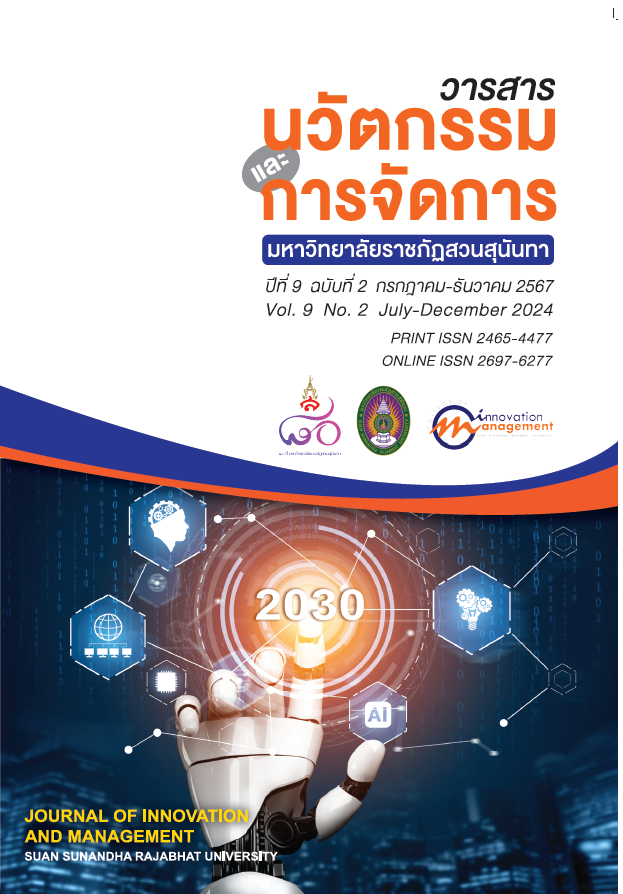Concept and Practice Based Instruction on Learning Outcome in the course Advanced Statistics for Research in Educational Administration
Keywords:
Concept and Practice Based Instruction,, Educational Administration,, Advanced StatisticsAbstract
This study aimed to achieve two objectives: (1) to compare the learning outcomes of doctoral students in the Educational Administration program enrolled in the course Advanced Statistics for Research in Educational Administration before and after instruction based on Concept and Practice Based Instruction; (2) to assess the students' satisfaction with the instructional approach employed in the course. The population consisted of 10 doctoral students in the program of Educational Administration. The study was conducted over a six-month period. There were two types of research instruments comprising (1) a test, and (2) a satisfaction assessment form. Data were collected directly by the researcher. Data analysis utilized descriptive statistics, including frequency, percentage, mean, standard deviation, and t-test. The findings indicated that: (1) the posttest mean scores of students’ learning outcomes, following Concept and Practice Based Instruction, were significantly higher than pretest scores at the 0.05 level; and (2) overall, the students expressed a high level of satisfaction with the course. The aspects receiving the highest satisfaction ratings were instructor characteristics and learning support resources, both achieving equal mean scores. These were followed by satisfaction with instructional management and measurement and assessment, respectively.
References
Anderson, R. S. and Speck, B. W. 1998. “Oh, what a difference a team makes”: Why team teaching makes a difference, Teaching and Teacher Education, 14(7), 671–686.
Anderson, L. W., and Krathwohl, D. R. (2001). A Taxonomy for Learning, Teaching and Assessing: A Revision of Bloom’s Taxonomy of Educational Objectives: Complete Edition. New York: Longman.
Ausubel, D. P. (1968). Educational Psychology: A Cognitive View. New York: Holt, Rinehart and Winston.
Bauwens, J. and Hourcade, J. J. (1995). Cooperative Teaching: Rebuilding the Schoolhouse for All Students. Austin, TX: Pro-Ed.
Bransford, J. D., Brown, A. L., & Cocking, R. R. (Eds.). (2000). How People Learn: Brain, Mind,
Experience, and School. Washington, D.C.: National Academy Press.
Bandura, A. (1997). Self-Efficacy: The Exercise of Control. New York: W.H. Freeman and Company.
Dewey, J. (1938). Experience and Education. New York: Macmillan.
Espinor, D. (2009). Co Teaching Handbook. School of Education, Seattle Pacific University.
Erickson, H.L. (1998). Concept-based curriculum and instruction. Calif: Corwin Press Inc.
Hattie, J., and Timperley, H. (2007). The Power of Feedback. Review of Educational Research, 77(1), 81-112.
Johnson, D. W., and Johnson, R. T. (2014). Cooperative Learning in 21st Century. Anales de
Psicología, 30(3), 841-851.
Jamornmann, U. (1996). Teaching Educational Statistics. Journal of Social Science Research, June 1996, 7-8. (in Thai)
Kiattanabamrung, W. (1994). The Effect of Conceptual Framework Testing Techniques on Learning Achievement and Attitude in Biology of Grade 11 Students. Thesis of the Degree of Master of Education. Bangkok: Faculty of Education, Chulalongkorn University. (in Thai)
Kitdee, K. (2004). The Development of an Assessment Model for Student-Centered Teaching and Learning. Thesis of the Degree of Doctor of Philosophy in Educational Measurement and Evaluation. Bangkok: Faculty of Education, Chulalongkorn University. (in Thai)
Klaiklam, K. (2008). The Influence of Coaching and Facilitation on Academic Achievement in
Applied Statistics for Behavioral Sciences 1. Thesis of the Degree of Master of Education in
Educational Statistics. Bangkok: Faculty of Education, Chulalongkorn University. (in Thai)
Kolb, D. A. (1984). Experiential Learning: Experience as the Source of Learning and Development. New Jercy: Prentice Hall.
Loertscher, D. and Erickson, H.L. (2006). Concept-based curriculum and instruction for the thinking classroom. Teacher Librarian, 34(2), 45.
Mayer, R. E. (2009). Multimedia Learning. Cambridge: Cambridge University Press.
Ministry of Education. (2002). National Education Act B.E. 2542 (1999), amended (No. 2), B.E. 2545 (2002). Bangkok: Kurusapa Press.
Ormrod, J. E. (2012). Human Learning. Northern Colorado (Emerita): Pearson.
Schunk, D. H. (2012). Learning Theories: An Educational Perspective. Boston, MA: Pearson.
Sapsopa, B. (2008). Factors Affecting Anxiety in Statistics and Academic Achievement in Statistics Among Faculty of Education Students: A Multivariate Analysis. Thesis of the Degree of Doctor of Philosophy in Educational Research Methodology. Bangkok: Faculty of Education, Chulalongkorn University. (in Thai)
Thongat, C. (2007). The Effect of Conceptual Teaching Models on Learning Achievement in Thai Language Usage and Conceptual Thinking Ability of Secondary School Students in Grade 8. Thesis of the Degree of Master of Education. Bangkok: Faculty of Education,
Chulalongkorn University. (in Thai)
Vygotsky, L. S. (1978). Mind in Society: The Development of Higher Psychological Processes. Cambridge, MA: Harvard University Press.
Woolfolk, A. (2019). Educational Psychology. Ohio: Pearson.
Yurarach, S. (2012). Evaluation of Teaching in Course ED 712 Advanced Statistics for Educational Administration Research. The Proceedings of the National Academic Conference, Sripatum University, 2012, October 26, Sripatum University, 902-911. (in Thai)
Downloads
Published
How to Cite
Issue
Section
License
Copyright (c) 2024 Journal of Innovation and Management

This work is licensed under a Creative Commons Attribution-NonCommercial-NoDerivatives 4.0 International License.
See Publication Ethics https://so03.tci-thaijo.org/index.php/journalcim/Ethics






